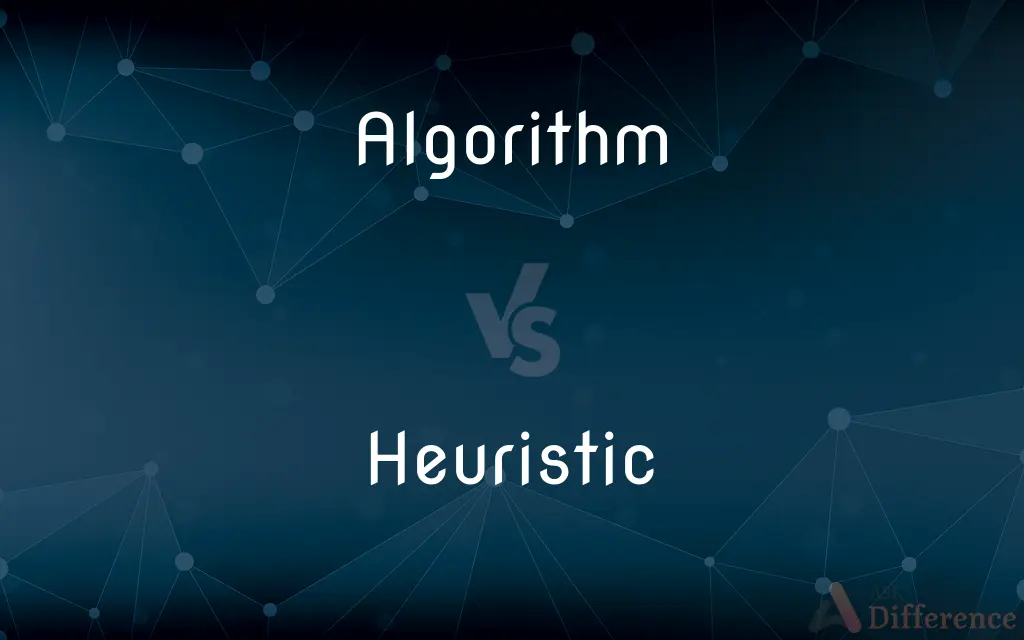Algorithm vs. Heuristic — What's the Difference?
By Tayyaba Rehman & Fiza Rafique — Published on November 21, 2024
An algorithm is a step-by-step procedure for calculations, while a heuristic is a general problem-solving approach using shortcuts.

Difference Between Algorithm and Heuristic
Table of Contents
ADVERTISEMENT
Key Differences
Algorithms are precise rules or procedures that guarantee a solution to a problem if followed correctly, ensuring consistency and reliability in outcomes. They are often used in mathematics, computer science, and disciplines requiring exact calculations. On the other hand, heuristics are more about employing practical methods and shortcuts that may not always guarantee a correct solution but are useful for making quick, efficient decisions or solving complex problems where an algorithmic approach is impractical.
Algorithms are deterministic, meaning they will consistently produce the same output from the same input, emphasizing accuracy and predictability. This makes them indispensable for applications where precision is paramount, such as in financial transactions or data analysis.
Heuristics, by contrast, are nondeterministic and can lead to different outcomes from the same inputs, depending on the specific situation or context. This flexibility allows for creativity and innovation in problem-solving but can also introduce variability in the quality of solutions.
While algorithms are invaluable for their ability to provide exact answers, they can be limited by their need for specific, well-defined problems and conditions. Heuristics, although they might not always yield perfect results, excel in dealing with ambiguity, uncertainty, and complex problems that do not have a clear path to a solution.
In summary, both algorithms and heuristics play crucial roles in problem-solving and decision-making, with algorithms offering precision and reliability in well-defined scenarios, and heuristics providing flexibility and efficiency in more ambiguous or complex situations.
ADVERTISEMENT
Comparison Chart
Definition
A set of precise steps to solve a problem.
A general strategy for problem-solving.
Nature
Deterministic and consistent.
Nondeterministic and flexible.
Solution Guarantee
Always provides a solution if one exists.
Does not guarantee a solution.
Application Field
Mathematics, computer science, etc.
Psychology, artificial intelligence, etc.
Example
Sorting algorithms, pathfinding algorithms.
Rule of thumb, educated guess.
Compare with Definitions
Algorithm
A finite sequence of well-defined instructions for calculating a function.
The Euclidean algorithm for finding the greatest common divisor of two numbers.
Heuristic
A simple, efficient rule used to make decisions, form judgments, or solve problems.
Using the heuristic taller people are better at basketball to pick team members.
Algorithm
A formula or set of steps for solving a particular problem.
Google's PageRank algorithm determines the importance of web pages.
Heuristic
An experienced-based technique for problem-solving, learning, and discovery.
An investor uses heuristics to choose stocks based on past trends.
Algorithm
A step-by-step procedure for solving a problem or accomplishing some end.
A sorting algorithm organizes a list of items into a particular order.
Heuristic
An approach to problem-solving that employs a practical method not guaranteed to be optimal.
A heuristic method for solving complex puzzles might involve starting with the easiest part.
Algorithm
A process or set of rules followed in calculations or problem-solving.
Cryptographic algorithms secure data by encrypting it.
Heuristic
A strategy used in the process of searching for information or a solution.
Heuristics guide the search in artificial intelligence systems to find solutions more efficiently.
Algorithm
A methodical, logical rule or procedure that guarantees solving a particular problem.
An algorithm in machine learning models helps in making predictions or decisions based on data.
Heuristic
A mental shortcut that allows people to solve problems and make judgments quickly.
The rule of thumb heuristic simplifies decision-making.
Algorithm
A finite set of unambiguous instructions that, given some set of initial conditions, can be performed in a prescribed sequence to achieve a certain goal and that has a recognizable set of end conditions.
Heuristic
Of or relating to a usually speculative formulation serving as a guide in the investigation or solution of a problem
"The historian discovers the past by the judicious use of such a heuristic device as the 'ideal type'" (Karl J. Weintraub).
Algorithm
(countable) A collection of ordered steps that solve a mathematical problem. A precise step-by-step plan for a computational procedure that possibly begins with an input value and yields an output value in a finite number of steps.
Heuristic
Of or constituting an educational method in which learning takes place through discoveries that result from investigations made by the student.
Algorithm
Calculation with Arabic numerals; algorism.
Heuristic
Pertaining to or based on trial-and-error and experimental methods of learning and evaluation.
Algorithm
A precise rule (or set of rules) specifying how to solve some problem; a set of procedures guaranteed to find the solution to a problem.
Heuristic
A commonsense rule (or set of rules) intended to increase the probability of solving some problem
Algorithm
A precise rule (or set of rules) specifying how to solve some problem
Heuristic
Of or relating to or using a general formulation that serves to guide investigation
Common Curiosities
What is an algorithm?
An algorithm is a detailed series of instructions for performing a task or solving a problem.
How do algorithms and heuristics differ?
Algorithms provide a guaranteed, specific solution through a fixed process, whereas heuristics offer a more flexible, often quicker approach without a guaranteed outcome.
Can algorithms and heuristics be used together?
Yes, in many complex problem-solving scenarios, both are used together to find efficient solutions.
Where are heuristics most useful?
Heuristics are useful in situations requiring quick decision-making, problem-solving under uncertainty, and when dealing with complex issues lacking clear solutions.
Why are heuristics not always reliable?
Heuristics are based on simplifications and assumptions that may not always hold true, leading to less accurate or suboptimal decisions.
Where are algorithms typically used?
Algorithms are widely used in computer science, mathematics, data processing, and automated decision-making systems.
What is a heuristic?
A heuristic is a general guideline or strategy used to make decisions or solve problems more quickly.
What is an example of a common heuristic?
A common heuristic is the "availability heuristic," where people judge the probability of events by how easily examples come to mind.
Can heuristics lead to biases?
Yes, because heuristics simplify decision-making, they can introduce biases or systematic errors in judgment.
How do heuristics work in artificial intelligence?
In AI, heuristics help guide the search for solutions in large or complex spaces by prioritizing certain paths or choices over others.
How do heuristics save time?
Heuristics reduce the cognitive load and amount of information needed to make decisions, allowing for quicker judgments.
Are there different types of algorithms?
Yes, there are various types of algorithms, including sorting algorithms, search algorithms, and algorithms designed for specific applications like machine learning.
Are algorithms only used in computing?
While algorithms are fundamental to computing, they are also used in mathematical procedures, logic sequences, and problem-solving across various fields.
Do algorithms always provide the best solution?
Algorithms aim to provide the best solution based on their design, but the "best" solution may depend on the context or specific requirements of the problem.
Can algorithms be wrong?
Algorithms can produce incorrect outcomes if they have bugs, are based on incorrect assumptions, or receive flawed input data.
Share Your Discovery

Previous Comparison
Matt Paint vs. Silk Paint
Next Comparison
Adobe Reader vs. Adobe AcrobatAuthor Spotlight
Written by
Tayyaba RehmanTayyaba Rehman is a distinguished writer, currently serving as a primary contributor to askdifference.com. As a researcher in semantics and etymology, Tayyaba's passion for the complexity of languages and their distinctions has found a perfect home on the platform. Tayyaba delves into the intricacies of language, distinguishing between commonly confused words and phrases, thereby providing clarity for readers worldwide.
Co-written by
Fiza RafiqueFiza Rafique is a skilled content writer at AskDifference.com, where she meticulously refines and enhances written pieces. Drawing from her vast editorial expertise, Fiza ensures clarity, accuracy, and precision in every article. Passionate about language, she continually seeks to elevate the quality of content for readers worldwide.











































